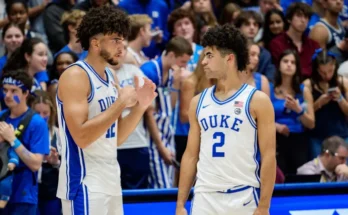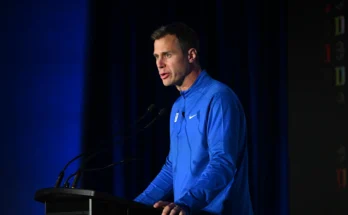In the ever-evolving landscape of college sports, Name, Image, and Likeness (NIL) has dramatically altered how programs recruit, retain, and develop talent. For Tennessee coaches, the challenge is clear: they must find ways to effectively navigate this new era of college athletics while fostering a competitive environment that attracts top-tier recruits, incentivizes player performance, and creates sustainable long-term success. As NIL opportunities become increasingly integral to college sports, Tennessee coaches need to embrace a strategic approach to competing for NIL money. This requires a combination of creative thinking, a deep understanding of market dynamics, and a focus on building strong relationships with key stakeholders.
First and foremost, it’s essential for Tennessee coaches to recognize that NIL money isn’t just about attracting top athletes but also about creating a brand around the program and its players. In a market as competitive as Tennessee, coaches must leverage the power of their programs’ brand identities to position their athletes and teams for success. Building a brand that resonates with players, fans, and businesses is crucial to attracting NIL opportunities and helping student-athletes capitalize on their likenesses. Coaches need to understand the value of brand building as it pertains to both individual players and the broader program’s image. The more recognizable and marketable a program becomes, the greater the potential for generating lucrative NIL deals.
Coaches can encourage athletes to embrace their personal brands by providing them with guidance on how to build a social media presence, create content, and engage with followers. With the right support, student-athletes can grow their online presence, making them more attractive to businesses looking to partner with high-profile personalities. By offering access to professional development resources, coaches can help their athletes position themselves to benefit from NIL in the same way high-profile influencers and celebrities do. This type of guidance not only helps players secure NIL deals but also strengthens the bond between coaches and athletes, creating a sense of mutual investment in each other’s success.
The next key element of competing for NIL money is the establishment of strong partnerships with local businesses and corporations. Tennessee has a diverse and vibrant economy, with many companies looking for ways to engage with athletes to promote their products and services. Coaches can actively seek out these opportunities by forging relationships with local business leaders, alumni, and corporate partners. Creating these connections will help ensure that Tennessee athletes have access to a wide array of NIL deals, from endorsements to local appearances and sponsored content. By fostering these relationships, coaches not only help their players succeed financially but also contribute to the long-term success of the program by enhancing its visibility and reputation.
Coaches should also explore innovative ways to incentivize player performance through NIL deals. One of the most powerful ways to ensure sustained success is by aligning NIL opportunities with athletic achievements. For example, Tennessee coaches could collaborate with businesses to create performance-based sponsorships. These deals would reward players for on-field success, such as touchdowns, sacks, or overall team performance. By tying NIL compensation to performance metrics, coaches create an environment where players are motivated to give their best effort while simultaneously benefiting financially from their hard work and success. This approach not only supports individual athletes but also boosts team morale and cohesion, as players understand that their success directly correlates to the rewards they receive.
Furthermore, coaches must consider how they manage NIL opportunities across the roster to ensure fairness and equity. While high-profile players naturally attract more NIL attention, it is important to create an environment where all athletes can benefit. Coaches should be proactive in ensuring that even lesser-known athletes have access to NIL opportunities by working with businesses that are interested in promoting a variety of players. This can be achieved through team-wide sponsorship deals, where businesses partner with entire squads rather than focusing solely on star players. By spreading the wealth, coaches can foster a culture of inclusivity and teamwork, demonstrating that every player’s contribution is valued.
Another strategy Tennessee coaches can use is to provide players with access to NIL education and legal resources. The complexities of NIL deals can be overwhelming for many student-athletes, especially those who may not have experience navigating contracts, taxes, or negotiations. Coaches can play a pivotal role by connecting their athletes with experts in these areas, such as legal advisors, financial planners, and tax specialists. By providing these resources, coaches ensure that their athletes can make informed decisions about NIL deals, helping them avoid common pitfalls and make the most of their opportunities. Coaches can also work with their athletic departments to develop educational programs that give players the knowledge they need to manage their NIL earnings responsibly. This empowers athletes to take control of their financial futures and positions them for success both on and off the field.
Tennessee coaches can also leverage their extensive networks to help athletes secure NIL deals beyond local businesses. While local sponsorships are valuable, the broader NIL market offers a wealth of opportunities from national brands and media companies. By tapping into their connections within the sports industry, alumni networks, and national sponsorship circles, coaches can help elevate their athletes to the national stage. These high-profile deals provide athletes with exposure and financial rewards that go beyond the state of Tennessee, helping them build long-lasting personal brands and secure opportunities that extend well beyond their college careers. Coaches who can facilitate these kinds of partnerships will establish themselves as leaders in the NIL space, further enhancing their programs’ reputations.
As Tennessee continues to grow its presence in the NIL landscape, coaches must also keep a close eye on the evolving regulatory environment. The NCAA and state governments have introduced various rules and guidelines to govern NIL activity, and these regulations are expected to change over time. Coaches need to stay informed about these developments to ensure their programs remain compliant and that athletes are fully supported in their NIL pursuits. This might mean working closely with legal experts and compliance officers to navigate the complexities of NIL regulations. Coaches should also advocate for fair and transparent NIL rules at the national level to ensure that the playing field remains level for all programs, including Tennessee.
In addition to the tangible strategies outlined above, coaches should also focus on fostering a culture of transparency, integrity, and ethical behavior when it comes to NIL. As NIL becomes a more prominent part of the college sports landscape, it’s crucial to ensure that athletes are making decisions that align with their values and long-term goals. Coaches should encourage players to think about the long-term impact of NIL deals on their personal brand and careers. This can involve open discussions about the pros and cons of certain deals and helping athletes avoid becoming solely focused on short-term financial gains. By prioritizing the well-being of their athletes and maintaining a culture of ethical decision-making, coaches can ensure that Tennessee remains a respected and competitive program in the NIL era.
Lastly, coaches must be prepared for the inevitable changes and challenges that come with the introduction of NIL. The landscape will continue to evolve, and new players will emerge in the NIL space, from collectives to third-party influencers. Tennessee coaches must stay adaptable and proactive in responding to these changes, finding new ways to connect their athletes with emerging opportunities. Whether it’s embracing new technologies, partnering with innovative businesses, or experimenting with unique NIL compensation models, coaches must remain agile in order to stay ahead of the competition.
In conclusion, competing for NIL money is not simply about offering the highest-paying deals but about creating a sustainable, long-term strategy that benefits both the athletes and the program. By focusing on brand-building, partnerships, performance-based incentives, fairness, education, and adaptability, Tennessee coaches can ensure that their athletes are well-positioned to succeed in the ever-changing NIL landscape. Coaches who take a thoughtful, strategic approach to NIL will not only attract top talent but also cultivate an environment that fosters player development, team cohesion, and program success. Ultimately, NIL is an opportunity for Tennessee to shine on a national stage, and the coaches who can navigate this new frontier will be the ones who lead the Volunteers to sustained excellence.



